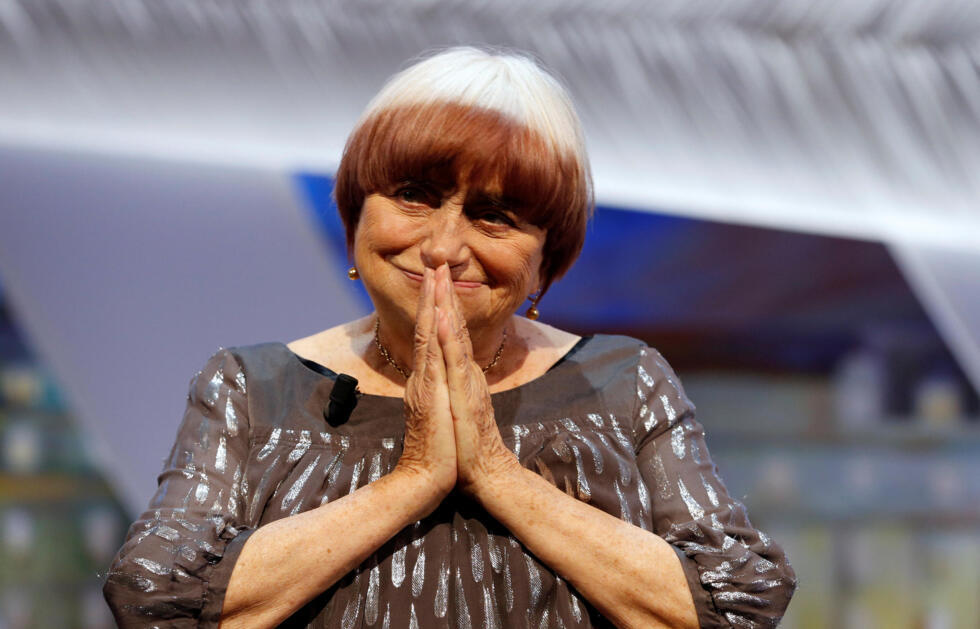
The Carnavalet Museum in Paris has delved into filmmaker Agnès Varda's family archives for an extensive exhibition highlighting her parallel career as a photographer, a practice she maintained fervently until her death in 2019.
The Carnavalet Museum – dedicated to the history of Paris and its people – is hosting a new exhibition dedicated to Varda’s long and diverse artistic career, thanks to archives carefully preserved by her family.
Her daughter Rosalie gave the museum’s curators access to Varda's 27,000 photo negatives, prints, notebooks, diaries and unfinished cinema projects, some of which have never been shown in public before.
For Rosalie, the exhibition is a way of putting Varda "back on the map" as a photographer in her own right. It also highlights the fact that her mother’s photographic work constantly informed her cinematic work, and vice versa.
"It’s true that she wasn’t recognised during her lifetime as a photographer," Rosalie – a costume designer, author and head of the family production company Ciné-Tamaris, founded by her mother in 1954 – told RFI.
"People knew she took photographs but it wasn’t considered part of her work. But I think from the beginning, photography gave her a lot of structure and helped her to adapt very easily from still images to moving images."

Seeing the funny side
For curator Anne de Mondenard – who spent two years preparing the exhibition "Agnès Varda's Paris from here to there" – it has been extremely satisfying to share lesser-known facts about her life and work.
"It is important to promote her work as a photographer…to show the consistency and quality of her work. I'm very happy to be able to show the links between her photography and her cinema," she told RFI.
All-female exhibition aims to restore women’s voices in art history

Instantly recognisable in her later years thanks to her impish two-tone page boy haircut, Agnès Varda's other trademark was her quirky sense of humour. With her keen eye for detail, she was always on the lookout for the whimsical in everyday life.
"We can sense her strong personality, her quest for freedom," said de Mondenard. "She has a way of taking a step back and looking for the surprising, comical side of certain situations."
A woman behind the lens
However, she took her work extremely seriously. Her determination is clear in her 1956 self-portrait in her studio, nestled off a quiet street named rue Daguerre in Paris's 14th arrondissement – aptly named after one of the inventors of modern photographic techniques.
The fact that she is not smiling speaks volumes at a time when women were either assistants or pretty actresses – and not generally the ones behind the camera.

Born Arlette Varda in Belgium in 1928, she lived in the south of France and then moved to Paris where she attended the prestigious Ecole du Louvre art school. She changed her name to Agnès in 1950, the year she registered her trade as a photographer.
She spent a number of years working with the Théâtre National de Paris taking portraits of actors, directors and employees, capturing their work on stage and behind the scenes.
This work helped her get jobs reporting for agencies and various publications as well as more portraiture work.
Spray it to say it: graffiti group sees women make their mark in Paris

A very modern view
As de Mondenard points out, Varda was never one to go for an easy shot. She purposefully sought out the hidden beauty of Paris, the details that others either would not see or would gloss over.
At times leaning towards a documentary feel, her photography was especially sensitive to capturing those on the margins, in down at heel areas of Paris.
For both de Mondenard and Rosalie, Varda’s dedication to the feminist cause through her art is also notable.
"Her work calls for deeper thoughtfulness," says Rosalie, recalling the portraits of nude women her mother captured in the early 1950s. "She saw the human body as architecture, not just portraits of languid naked women. I find that to be very modern."
France's famous yet forgotten couturier makes a comeback, 100 years on
De Mondenard points to Varda’s films Cléo de 5 à 7 (Cléo from 5-7) and L'une chante, l'autre pas (One sings, the other doesn’t), both made in the 1960s, both with strong female protagonists.
Her pioneering work in making women's voices heard in the film industry earned her an honorary Palme d'Or at the Cannes Film in 2015, an award she dedicated to "resistance and endurance".
When it comes to the breadth of her work, it is Agnès herself who sums it up best. In the documentary Varda par Agnès (Varda by Agnès), she declared: "It's natural for me to go here and there, to say one thing and then the opposite, and to feel less trapped because I don't choose just one version of things."

Le Paris d’Agnès Varda, de-ci, de-là is at the Musée Carnavalet in Paris until 24 August, 2025.







